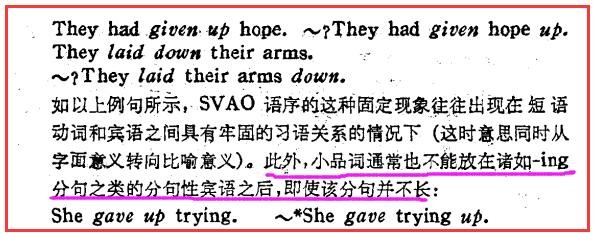10 give up doing 与 give doing up 的判断依据
网友在前面一个问题提到 give up doing 的分析,老师们的分歧很大,争论很激烈:
https://www.cpsenglish.com/question/60222
其中千千老师解释说:根据英语习惯,对于“动词+副词”构成的及物性短语动词——如果宾语是名词,可以将名词放在 up 之前或之后;如果宾语是代词,则只能将代词放在 up 之前;如果宾语是动名词,则只能将动名词放在 up 之后。这个解释的前面两点,没有问题,对于最后一点“如果宾语是动名词,则只能将动名词放在 up 之后”,这个观点有依据吗?
最佳答案 2023-12-14 21:53
我查看了一下前面一个问题,大家的讨论很热烈,对于 give up doing 的分析,老师们的分歧很大。其实千千老师的解释是对的,网友现在需要“依据”,其实很多权威语法著作都提到过,当“动词+副词”这类短语动词为及物动词时,如果它后面可以接动名词作宾语,这个动名词只能放在副词小品词的后面,即使这个动名词很短也是如此。比如 R. Quirk 就在其语法大全上提到这一点:
正:She gave up trying.
误:She gave trying up.
下面是相关截图:

再附更详细的截图,供大家参考:

如果觉得我的回答对您有用,请随意打赏。你的支持将鼓励我继续创作!

其它 3 个回答
我刚看到前面一个网友的问题,做了解答,我把部分解答粘贴到这里:
give up 和put off等短语,当宾语为名词或代词时才可以提前。doing 是gerund,不属于noun.虽然它有名词功能,汉语又翻译为动名词(也许名词两个字误导了你),但属于非谓语动词,不是名词。所以不能前移。
依据:The free dictionary: 请注意黑体字部分的描述:
https://idioms.thefreedictionary.com/give+up
Give up:
1. To yield or relinquish something. A noun or pronoun can be used between "give" and "up."
This is a prime parking space—I'm not giving it up!It would be a shame if you had to give up this apartment—it's such a great location.
https://idioms.thefreedictionary.com/put+off
Put off:
verb To delay doing or dealing with something; to procrastinate instead of doing something.
A noun or pronoun can be used between "put" and "off."
Why did I keep putting off working on this essay? Now I'll be up all night writing it.
If you put off getting car insurance, you could wind up in jail if you get in an accident.
另外补充一点,名词化的动名词,可以前移。如:give smoking up.=give up smoking.
请看外刊例句:、



如果觉得我的回答对您有用,请随意打赏。你的支持将鼓励我继续创作!

《常用英语短语动词用法手册》(第9-10页)指出:“即使是可分短语动词,动名词宾语也要放在虚词后面,不能放在动词与虚词之间。
He has had to give up dancing. 他不得不停止跳舞。
We will put off deciding until next week. 我们将推迟到下周再作决定。”
【注】《常用英语短语动词用法手册》是黄浩枢根据美国麦克米伦出版公司出版的 The Key to English 中的 Two-word Verbs 编译的。其中的“可分短语动词”即“动词+副词”型短语动词,上述译文中的“虚词”就是副词。
- 7 关注
- 5 收藏,3123 浏览
- 柏晓艳 提出于 2022-10-29 01:33
相似问题
-
 《高考英语备考1号·速效编》
《高考英语备考1号·速效编》
-
 《高考英语备考1号·写作编》
《高考英语备考1号·写作编》
-
 《高中英语晨读晚记》
《高中英语晨读晚记》
-
 《高中英语错题笔记》
《高中英语错题笔记》
-
 《零起点考大学英语》
《零起点考大学英语》
-
